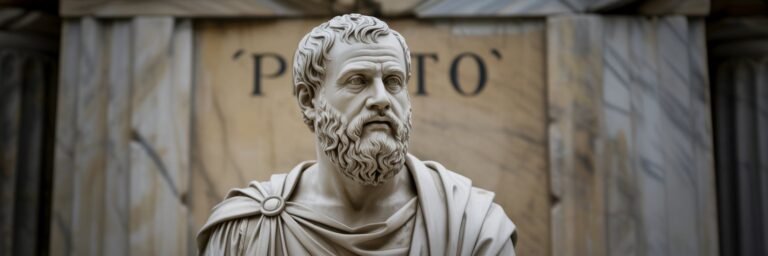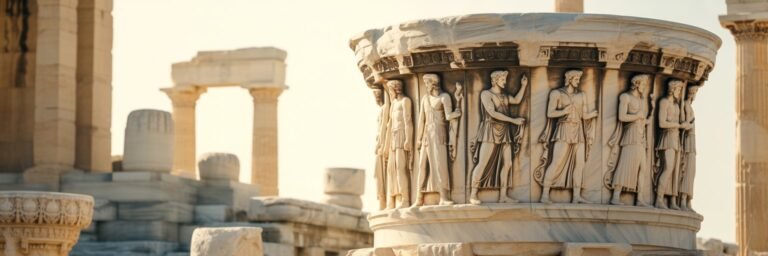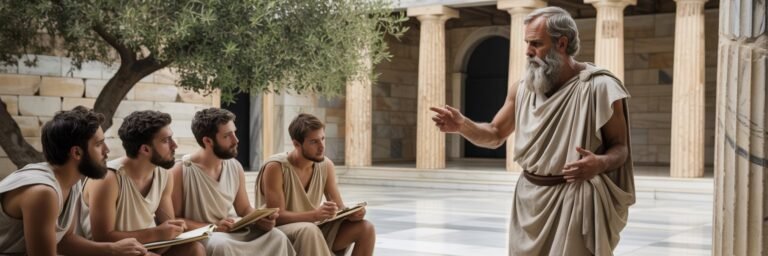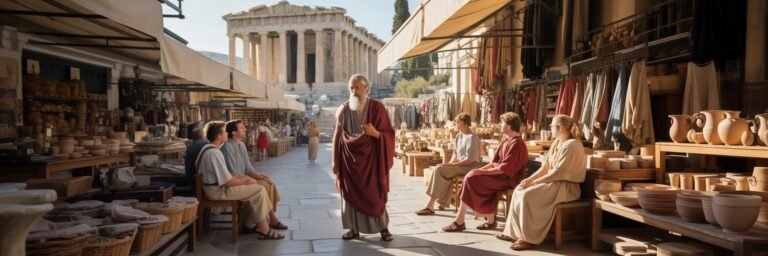INTRODUCTION
Wandering through the sun-kissed ruins of ancient Athens or seeking solace in the shadowy corridors of Delphi, the palpable presence of a once vibrant civilization permeates every stone. It is within these remnants of Classical Greece, and the rich layers of mythology and religion that imbued the everyday lives of its residents, that we strive to uncover the complex and dynamic belief system of one of history’s most influential cultures.
HISTORICAL BACKGROUND
The practice of religion in Classical Greece encompassed far more than attendance at a temple; it permeated all corners of daily life. From the household shrine to the magnificent structures on the crest of the Acropolis, the collision of deity and reality for the Greeks was pervasive. The belief system was polytheistic and systemic, stretching back to the Mycenaean civilization of the late Bronze Age, integrating gods, goddesses, and mythical creatures into a finely woven tapestry of narratives.
The Olympian gods, led by Zeus, the king of the gods, reigned from their mythical mountain, influencing the lives of mortals and immortals alike. Simultaneously, less prominent deities, spirituality-infused natural phenomena, and revered mythical heroes were sanctified in local and regional cults, resulting in a divine spectrum as diverse as human experience itself. This multifaceted belief system provided a framework through which the Greeks made sense of their world, construct societal morals, and, perhaps most importantly, grappled with the universal human conundrum of mortality.
THEORIES AND INTERPRETATIONS
Classical Greek religion has been the subject of much interpretation. Established academics, like Walter Burkert, have posited theories that encompass the structure of Greek society, the power of ritual and sacrifice, and the intimate link between mythology and religion. Burkert emphasized the role of sacrificial rituals, asserting they served not just as religious duties but helped to foster social cohesion.
However, emerging interpretations highlight the expansive scope of the spiritual in Greek life. Scholars such as Sarah Iles Johnston argue for a more nuanced view of Greek religion, emphasizing the complexity of the belief system that extended beyond the state-sanctioned worship and permeated all aspects of daily life. Additionally, the esoteric rituals of the mystery cults, like those of Eleusis and Dionysus, hint at a layer of religious expression more concerned with personal spirituality and ontological exploration.
MYSTERIES AND CONTROVERSIES
The interpretative complexity of Greek religion often led to several controversies among historians. The substance of the Eleusinian Mysteries, arguably the most renowned of the Greek mystery cults, continues to perplex scholars. The secrecy of the rites, intended for the privileged initiated, led to an academic impasse. The strongest hypotheses, such as those of Carl Kerenyi, hinge on a profound spiritual transformation experienced by initiates, possibly facilitated by an induced altered state of consciousness.
Another notable controversy involves the apparent dichotomy between the Olympian gods and the chthonic deities. Questions have been raised about the relative importance of these two types of divinity within Greek religious practice, with some scholars arguing that chthonic gods, associated with the underworld and death, were overshadowed by the Olympians due to discomfort with mortality.
SYMBOLISM AND CULTURAL SIGNIFICANCE
Classical Greek religion has provided us with an abundance of symbolic cultural expressions, many of which emphasize the Greeks’ deep reverence for the natural world and human excellence. Animals, plants, mountains, and rivers had deities tied to them, and natural phenomena were often perceived as divine manifestations.
The myths woven around these deities served as cultural signatures, embodying ethical standards, societal values, and human experiences. For instance, the story of Oedipus, a tragic cautionary tale of ignorance and futile resistance against divine will, reflected a deep societal conviction in the power of fate and the gods. These myths, often encapsulated in dramatic verse and tragic plays, continue to shape our understanding of Greek society and its values.
MODERN INVESTIGATIONS
The study of Classical Greek religion has expanded and evolved in the modern era. Advancements in archaeological techniques have allowed us to unearth new evidence, such as the recently excavated Sanctuary of Artemis Amarysia on the island of Euboea, offering fresh insights into ancient religious practices.
Meanwhile, interdisciplinary researchers like anthropologist Peter Kingsley delve into the mystical traditions of pre-Socratic philosophy, proposing that the origins of Western culture are steeped in spiritual practices akin to shamanism. These conversations not only challenge traditional narratives but deepen our understanding of the vast complexities within Greek religion.
LEGACY AND CONCLUSION
The legacy of Greek religion and mythology is firmly imprinted on Western civilization. Its echoes resonate in our art, literature, and philosophy, continuously inspiring us to reflect on their timeless themes. Classical Greek religion, with its theological plurality and deeply personal facet, may seem to encompass contradictions, but it mirrors complex human realities and aspirations.
Woven from the thread of human experience, these tales and beliefs were not merely constructs of the past, but windows into an ongoing conversation between humanity and the divine. More than just archaic fragments of past societies, these narratives invite us to question the roots of our beliefs, ethics, and even the nature of our existence. Thus, our understanding of Classical Greek religion continues to evolve, opening us to new interpretations, illuminating paths of inquiry, and keeping this ancient belief system enduringly relevant and profoundly human.





